Living Your Values
How I Got From There to Here
When I first decided that I needed to leave my corporate job for my health and happiness, I didn’t know what else I would do for a living. It was the summer of 2012, and while recovering from a series of cold and flu’s, I read several of Martha Beck’s books. Most notably, Finding Your Way in a Wild New World, that I link to on my Resources page (I receive a small commission for items purchased through this link and appreciate them very much!). The book helped me broaden my thinking and to expect to discover little hints and nudges that would point me towards my next career.
I also did a series of mind mapping exercises. I took blank paper and markers and wrote words that described what I valued, what I enjoyed, and what I was good at. Then I drew lines to connect the words and phrases that had something in common with each other. What I discovered surprised me – I was very interested in ambiguous problems, and doggedly researching clues and analyzing my findings until I had a resolution. And then I liked to write up my results in a report. As I considered what I’d learned from Martha Beck’s books and looked at my mind maps, I thought the obvious conclusion was that I should be a detective. More specifically, a Private Investigator.
All the pieces lined up: I wanted to focus deeply on finding the truth and the details in missing persons cases, skip-tracing people who failed to show up for court dates, and run background checks. The results of which I could package into neatly organized reports for my clients.
I was so certain that this was my next career move that I got certified to work as a PI, wrote a business plan, took a human footprint tracking course, and registered a domain name for my future investigation business: Truth and Details.
As I completed more and more of the items in my plan to quit my job, I decided that immediately after quitting I would spend a month in writing classes at Boulder’s Jack Kerouac School of Disembodied Poetics before launching my PI business. Then in the weeks before heading out to Colorado, a former colleague and I decided to start a real estate investment company that would democratize the way people invested in rental properties.
Suddenly, the PI business was on hold: I could start that at any time. I wanted to immerse myself in writing for a month and then when I got home, to bring this new business idea to life. The writing classes were great. The real estate business didn’t take off. I still believe in the concept, but it would have been a risky, long-term investment and I needed income.
So I turned to consulting, which I always thought of as a backup plan. It turns out that I love consulting, and use many of the skills that attracted me to investigation work. I like to unravel clients’ problems, analyze data, formulate solutions, and wrap everything up in a tidy report-out of results.
I did not transition into the business I planned on in 2012, but taking those steps gave me the confidence and preparation I needed to get to where I am now: in a satisfying career that aligns with my interests and skills. It is interesting that my company name and values remained the same: providing clients the truth and details they need to achieve their objectives.
Backup plans: I like them
In the tech world, I’ve always been drawn to the practice of redundancy. I’m not at all embarrassed about it – I embrace my geekiness.
Redundancy means you’ve planned well and are prepared for problems. Back up your data on another drive or in cloud storage and if your PC crashes you can recover your work. Sync your phone with your PC address book and when you get a new phone, your contacts are transferred over. For big projects, have multiple servers running your site so that when one goes down because a technician accidentally kicked the power cord out of the wall (this happened) or forgot to apply a patch (this also happened), your customers can still find you on the web.
I also like backup plans for business. Cash reserves keep you going if business slows down or you have unexpected expenses. Maintaining a wide network of contacts provides more future opportunities if your current situation doesn’t work out. Having more than one fine-tuned skill lets you be flexible if the business landscape changes and there isn’t a strong demand for what you used to do.
When obstacles appear, backup plans let you handle them more effectively. When everything is running smoothly, they give you more options.
Gotta keep this short – I’m having fun installing a new backup drive and creating a system image for my PC. One handed. Because the other hand is flyin’ my geek flag!
What we do for money
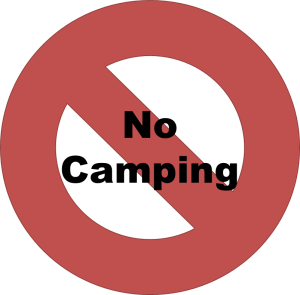 I was talking to a friend the other day about how people believe they are limited in their career choices because of money. We both know many people in well-paid professions who aren’t happy with their jobs. They work exhausting hours or feel like their skills are being wasted, or they can’t stand their work environment. The options they consider include finding a similar job elsewhere or toughing it out and hoping things improve.
I was talking to a friend the other day about how people believe they are limited in their career choices because of money. We both know many people in well-paid professions who aren’t happy with their jobs. They work exhausting hours or feel like their skills are being wasted, or they can’t stand their work environment. The options they consider include finding a similar job elsewhere or toughing it out and hoping things improve.
There are more options, of course, but many people eliminate the ones that involve scaling down their lifestyles unless they are forced to. Expensive houses can be sold to live in smaller, more affordable homes. Luxury cars can be traded in for economical models. Resort vacations can be replaced by… camping. I’m laughing as I write this – I’m not much of a camper. But you know what I mean.
The point is, if you hate your job but love your paycheck, is it worth it? There’s no judgment if the answer is yes. It’s great to have money to spend on things that we enjoy and different people have different priorities.
I’m glad I got to experience some incredible vacations in the past, and my biggest expense is still my mortgage. But I spend less and save more in order to have the career that I want. And I wouldn’t trade it for a bigger house or a Mercedes or an annual trip to the Four Seasons Hualalai.
Give Yourself a Break
If you’ve set goals or made plans and haven’t exactly followed through on them, give yourself a break. Beating yourself up isn’t going to deliver your achievement.
There are all kinds of reasons why progress slows down and sometimes comes to a stop. Maybe your immune system is lowered by the cold and flu season or because of extra stress in your life. Maybe you’re going through a challenge or transition and you have less energy than normal.
You could power through the fatigue and stress – for a while. Eventually your body will overrule your ambition and you’ll find yourself with less energy and strength than you had in the first place.
Instead of blaming yourself for not powering through your body’s requirement for rest, you could choose to accept it. It is only a temporary phase, after all. You could choose to acknowledge what is happening: “I am tired and have less energy. I need extra rest.” Then, you could allow yourself a break while you regain your strength.
This is not laziness. It is demonstrating self-awareness and self-value by placing your health among your highest priorities.
You may have created a deadline in your mind, or hoped for an achievement by a certain timeline. However, your body has its own reactions to your external environment, and its own ways of gauging what your mental, physical and emotional status is.
As a personal example, early this autumn I hired an editor to refine my manuscript. When she sent back her recommendations, I was excited and planned to finally finish my book within a month. Then my cat died, my business demanded extra attention and I had unexpected stressful events to deal with.
I wanted to work on my book. I’m so far past the time when I thought it would be published that I’m embarrassed when people ask me if it is available for purchase yet. Despite my wants and my ego, I decided to listen to my body when it told me I needed a break. I cut back on my obligations, slept a lot more, and stopped thinking about my book.
Two and a half months went by – not my ego’s timeline, but my body’s. Then I was ready to pick up my manuscript again.
As it turns out, putting it aside for a while made editing easier than in the past. I looked at my writing with a fresh perspective. I came up with a method of giving myself a small editing assignment each day that followed the same pattern. I keep a running list of each assignment on a piece of notebook paper and write “done” next to each task when I’m finished. Then I jot down the next assignment.
I wonder how much better my editing is now than if I had tried to force myself to do it when my mind and my energy weren’t ready?
I hope that you are full of good health and making progress in the areas of your life that make you happy. If not, maybe it is time for a break. A break without self-judgment or letting your ego make you feel disappointed. Maybe it is time for a healthy, restful break that you will emerge from better than ever.
The Success Stories We Don’t Read About
My friend sent me this link to a Malcolm Gladwell article that discussed the differences between early geniuses and late bloomers. It is nice to see a nod to the people who have worked hard at their professions for many years, and finally attain the level of success they dreamed of.
I liked this article. I also think that the media’s love of the big success stories leaves out a lot of inspiring people.
There are other ways of looking at career success beyond the young genius and the older achiever. Some people might be successful in multiple parts of their work life from youth to old age.
That success might be in the form of earning millions of dollars, or by introducing a product or service that positively impacts a large group of people. The success might be satisfaction from achieving a high level of skill in topics they are passionate about. Maybe it is pride in taking a career risk that improved the quality of their lives. It might be a feeling of contentment from diligently pursuing work that allows them to support family members.
I would like to read inspiring news stories that feature the success of people who do well but aren’t famous and didn’t generate top hits in their fields.
Thinking about success more broadly leaves room for people that have patchwork careers or successive careers in different areas. Without a single-minded focus they probably won’t be among the highest level of experts in a field and may or may not have a lot of earnings, but they amass a breadth of knowledge and skills and may be successful in many other ways.
So here’s a shout out to all the people who work hard to achieve their own definition of success. Cheers to your achievements!
You really can go after what you want in life and get it
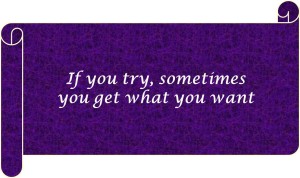 This evening as I was leaving my client’s office, I ran into a friend that I hadn’t seen for a few years. She asked how my life has been since I quit my job in the summer of 2013. I gave her the highlights of going to the Jack Kerouac School for a month of writing classes, starting a business that didn’t work out and then doing consulting work and realizing I love it.
This evening as I was leaving my client’s office, I ran into a friend that I hadn’t seen for a few years. She asked how my life has been since I quit my job in the summer of 2013. I gave her the highlights of going to the Jack Kerouac School for a month of writing classes, starting a business that didn’t work out and then doing consulting work and realizing I love it.
She expressed how glad she was that my career has gone well for me in the last year and a half and I was touched that she was happy for me. She said something else, though, that made a big impression. She said, “You are proof that people really can go after what they want in life and get it.”
My career isn’t perfect. Finding great clients can take time and be nerve wracking. Running my own business comes with a whole set of accounting tasks, licensing and taxes that I didn’t have to deal with when I was a full time employee.
And yet.
I went after what I wanted in my work life and got it. More flexibility and autonomy. Less bureaucracy. More enjoyment of my day-to-day work life. Less stress. More opportunities to use my skills set and keep learning.
You really can go after what you want in life and get it.
Something Beautiful to Look At
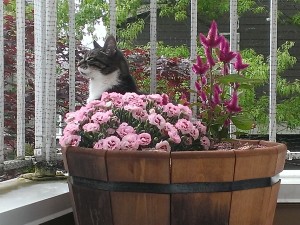 Last spring I planted flowers in the pots in my backyard. Nothing extravagant. There were Bougainvillea, Chrysanthemums, and some filler plants that I don’t know the names of and that I hoped would live through the heat, the shade, the bugs and the squirrels that always want to hide their peanuts in those planters.
Last spring I planted flowers in the pots in my backyard. Nothing extravagant. There were Bougainvillea, Chrysanthemums, and some filler plants that I don’t know the names of and that I hoped would live through the heat, the shade, the bugs and the squirrels that always want to hide their peanuts in those planters.
Every time I walked past my back door, I saw the flowers in their pots and felt a rush of happiness. It was like looking at the beautiful flowers gave me a boost of positive energy.
I noticed this feeling again when I had wrapped Christmas presents for my family and set them under my little fake tree on a cabinet. Every time I walked past the cabinet I thought the presents looked so pretty sitting there, and I felt more cheerful. I’m no expert with wrapping paper, and don’t go wild with Christmas decorations. In fact I didn’t put a single ornament on that tree, but the presents made it pretty enough.
It made me think about how useful it is to have something beautiful to look at throughout the day. It adds a little spark of happiness that stays with me and brightens my day.
It also made me wonder why I don’t get the same boost of happiness when I look at the things that are more permanently in my house – paintings, the cheerful yellow bedspread that took me months to pick out, or my grandmother’s chandelier. Well, the chandelier makes me feel good because it reminds me of my grandmother and her unique taste. Turquoise blue painted over brass! But that is a different kind of beautiful that comes from family love.
I realize that part of the joy of looking at something beautiful is its temporary nature. The flowers die and nothing much grows in the backyard until it is warm again in spring. I enjoyed looking at the wrapped presents because a few days later my family unwrapped my handiwork. I asked them to “sufficiently admire the packages before opening them!”
The flowers and wrapped packages don’t last long enough for me to get used to them like I do with my paintings and bedspread.
So now that I am without flowers on the deck, and have no pretty presents to look at, I am making an extra effort to notice any pretty thing that I see while I’m out for a walk, or in a store, or if I catch a glimpse of a bluebird that sometimes rests on a branch outside my office window.
Little beautiful things to look at to brighten my day.
Why I’m Not Planning For The Year Ahead and Using My Three Best Productivity Tips Instead
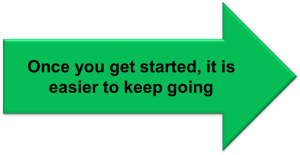 Each December and January I receive dozens of emails from productivity experts, and coaches and authors who write books about how to achieve your goals. They each recommend a system for setting goals for the new year ahead.
Each December and January I receive dozens of emails from productivity experts, and coaches and authors who write books about how to achieve your goals. They each recommend a system for setting goals for the new year ahead.
Last year I sifted through these choices and decided to use a comprehensive Word document planner. As I wrote my answers to the questions provided, I listed the focus areas of my life, my values, what I care about, how I want to feel and the skills I enjoy using. Then I made a table in my word document and listed my goals in the first column. Then I matched each of the other areas that I’d identified (values, what I care about, etc) with that particular goal.
Then I identified how I use each hour of the day vs. how I want to use each hour of the day, how I will work towards achieving my goals in each month of the year, and on and on. The entire document was eight pages. I was very serious about it, and it took me three days to complete it.
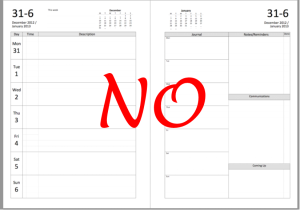 And then I never looked at it again until I opened the file to start writing this blog post.
And then I never looked at it again until I opened the file to start writing this blog post.
Almost immediately after I completed the planning document, I regretted that I wasted three days planning out my year instead of getting to work on the projects that I already know are most important to me. I didn’t need to list them on paper.
As I look back at the year that has past, that planning document didn’t help me at all.
Most of my goals turned out just fine. I launched my consulting company and am happy with the results of my first year in business. I took care of my health and my relationships. I launched my blog.
However my biggest goal was also my greatest challenge throughout the year: editing my book and preparing it for publication. The challenges are that it takes intense focus, a block of time to get my head into the work, energy and alertness, and what is often the toughest part: making my way to my office chair to open the document and get to work. Although I worked on it throughout the year, I’m frustrated that I still don’t have an agent-ready manuscript.
This year I am not filling out any annual planning worksheets or setting goals beyond using the best techniques that helped me move my book forward.
In order of the success I had with them, my tips for achieving goals are:
- Creating the smallest habit possible and then committing to repeating it every single day no matter what. For me, this was opening my word document and editing one sentence every day. Making the commitment was enough, but I sometimes used “The Chain Habit”, where you mark on a calendar each day that you complete your goal.
- Allowing other people to push you forward. This isn’t always pleasant. It can feel a little like bullying. But nudges from other people got me to reach out to the one editor that I wanted to work with. She accepted my project and I was thrilled with her edits and suggestions.
- Using self-talk to motivate yourself. Most of us learned in science class that a body in motion is likely to stay in motion and a body at rest is likely to stay at rest. So when I feel inertia, I tell myself that I just have to get started by opening my word doc. Once I get started, everything will be easier.
Whether you enjoy creating detailed plans for the year ahead or reject the whole concept, I wish you the best of luck in achieving your goals this year.
You Don’t Need Permission to Rest
You don’t need permission to rest.
You don’t need permission from someone else to take a break. You don’t need to wait for your boss, your spouse or your friends to tell you that you are allowed to have some time to take care of yourself.
You don’t have to earn your right to rest. It is a human need. Remember that babies sleep a lot and nobody questions whether they deserve it.
Self-care is a buzzword lately, but what exactly does that mean? There is no self-care prescription, such as “soak in a bubble bath one hour before bed.” Maybe you hate baths or don’t even have a bathtub.
Only you know what will give you the rest and rejuvenation that you need. For some people that might be getting an extra hour or two of sleep each night for the next few months. For others, it could be taking walks every day. Different people might make a point to go to the gym, get acupuncture, spend more time with friends, or spend more time alone. If you don’t know what you need, start by asking yourself “What is the kindest thing I can do for myself today?”
If you’re overworked, burned out, sick, stressed or need a break from coworkers and family, take it. If other people are counting on your participation in certain activities, negotiate up front. Agree to deliver the presentation your manager wants by the end of the day, and then be clear that you won’t be online or checking mail for the next week while you’re out on vacation. Tell your friends you’ll meet them for dinner but need to leave the restaurant by 8PM. Participate and enjoy the people you’re with with you’re with them. Then leave the office or the dinner with friends when you’re tired.
If there are household chores to do, or extended family staying at your house for an extended period of time, agree upfront what will be done when, and by whom. Then let everyone know when you’ll be out of the house to go exercise, or that you need two hours of alone time to nap in your room.
Whatever it is that you need to shed stress and fatigue, do it. You don’t need permission to rest.
Choose Your People
Seth Godin recently posted a blog asking business people to consider what kind of customers they want. He expanded that to include other people like backers, members, and vendors and had a list of adjectives ranging from loyal to litigious.
The same thinking can be applied to any relationship. Focusing on business:
- What kinds of coworkers do you want to collaborate with?
- What kind of manager do you want to take direction from – or what kind of employees do you want to delegate to?
- What kind of company leaders are you willing to align yourself with?
Listing adjectives is a great way to identify what is important to you about the people you will interact with in business. Work satisfaction isn’t just about the job responsibilities, salary, location and hours. Think of how happy you can feel when you have a positive connection with the people you engage with, and how miserable you can feel when your personalities, work styles or values clash.
I think Godin’s most important point is that you have some choice and influence over the type of people you work for and with. If your management makes unreasonable demands of you, can you assert your boundaries without being punished or fired? If not, that doesn’t sound like a great place to work. As an entrepreneur, if you value signed contracts defining your scope of work and payment terms but your customers balk, maybe those aren’t the right customers for you.
To an extent, people learn how to treat you based on how you interact with them. If you put up with bad behavior, you’re teaching the offenders it is ok to treat you that way. If you react calmly and with an open mind when someone brings a conflict to you, you teach them that they can bring difficult issues to you without fearing your reaction.
Who do you want to work with? And how are you teaching them to treat you?



Recent Comments